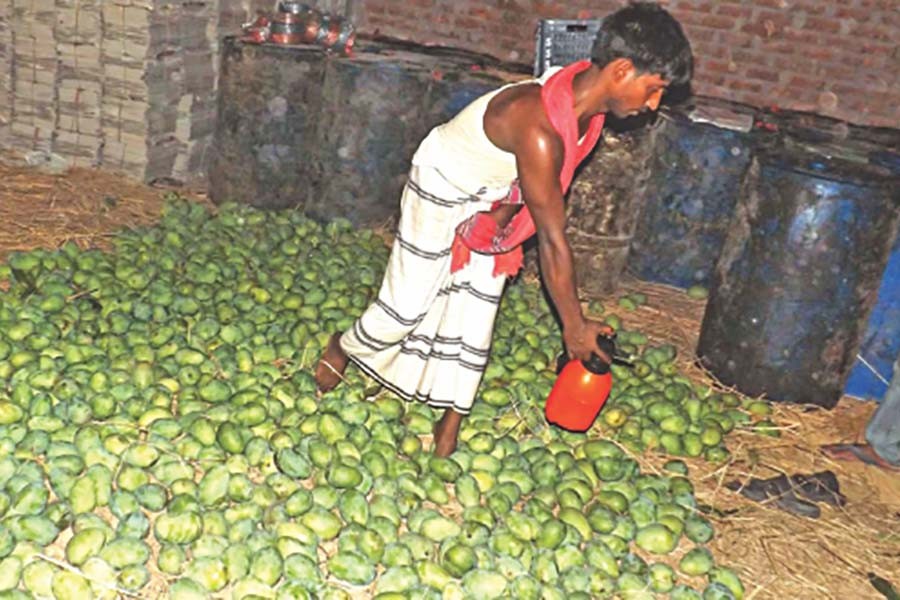Consumers now have fair reasons to be confused over the issue of ripening mangoes and other fruits using 'hazardous' chemicals.
The source of their confusion surely is a newspaper report on the effect of the use of certain chemicals for ripening mangoes and some other fruits.
A leading vernacular daily in a report published on Wednesday last, quoting the officials of the Bangladesh Food Safety Authority (BFSA), said the use of carbide (calcium carbide) and ethephon for ripening fruits is not as hazardous to human health as being publicised.
Such observation comes against the backdrop of ongoing drive of the Rapid Action Battalion (RAB) and the Dhaka Metropolitan Police (DMP) against marketing of mangoes ripened through the use of 'hazardous' chemicals such as carbide and ethephon.
The RAB has already destroyed 2500 maunds and the DMP 400 maunds of artificially ripened mangoes during a couple of drives.
The BFSA reportedly has said the mangoes are being destroyed out of misconception on the part of the relevant agencies about the application of chemicals on fruits.
The chairman of the BFSA, reportedly, told the newspaper that the application of ethephon on fruits in low concentration is legal. But the use of carbide is illegal. But, he said, since carbide has no residual effect it is not that hazardous.
But carbide is known to be a carcinogenic agent. It is banned in India under Food Safety and Standards Regulations. Ethephon being a pesticide is also not recommended as a ripening agent. However, the chemical is used in specified quantity in Europe Union countries for ripening of fruits such as mangoes and bananas.
Experts engaged in food safety research here have a sort of soft approach towards the use of carbide on mangoes and bananas for ripening. They are of the opinion that the use of the chemical does not pose any health threat since both the fruits have thick skins and are consumed after peeling.
In the light of observations made by the BFSA, the actions so far taken by the law enforcers and other relevant agencies, including destruction of mangoes, for alleged use of hazardous chemicals could be subjected to legal scrutiny. However, that is very unlikely, at least, for a couple of reasons.
Firstly, the traders affected by the actions would not dare initiate legal actions against the law enforcers seeking financial compensation. Secondly, the traders, in most cases, do apply ripening agents being unaware of their hazardous properties or the safe doses of some chemicals.
Actions are often taken against alleged use of hazardous chemicals without any valid evidence. If the application of ethephon up to certain degree is legally allowed for ripening fruits, prior to taking actions, it is important to carry out a chemical examination to know about the presence of chemical/s and the doses applied.
Moreover, the application of ethephon is allowed as a pesticide. It needs to be determined whether the safe food act allows its use as a ripening agent.
So, there exists a kind of haze around the legal actions that are often initiated against traders, allegedly, for ripening of fruits using chemicals. The mist needs to be cleared first by relevant quarters.


